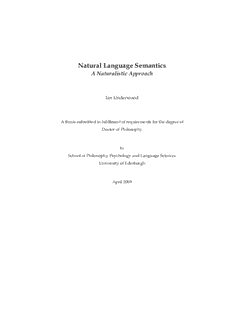
Natural Language Semantics - Semantics Archive PDF
Preview Natural Language Semantics - Semantics Archive
X X X X X Natural Language Semantics A Naturalistic Approach IanUnderwood Athesissubmittedinfulfilmentofrequirementsforthedegreeof DoctorofPhilosophy to SchoolofPhilosophy,PsychologyandLanguageSciences UniversityofEdinburgh April2009 Abstract Within linguistics, the dominant truth-conditional approach to semantics belongs to the Tarskian, model-theoretic tradition. Theories in this tradition offer an abstract, math- ematical description of the truth conditions of natural language expressions in terms of their correspondence with the world. This thesis takes issue with existing model- theoretic accounts of quantification on the basis that the specific abstract relations that theydescribecouldnotplausiblybemodelsofnaturallanguage-to-worldrelations. Recentdecadeshaveseenmuchphilosophicalinterestinnaturalistictheoriesofreference and mental content. In one sense, these theories address the above concern by trying to identifysomethingnaturalisticforsemanticcorrespondencetoconsistin,suchascausal- historical chains or ceteris paribus laws. In another sense, they fail to address the prob- lem, since no account is given of either the semantic structure or the truth conditions of eventhetiniestfragmentofanaturallanguage. Crucially,itisfarfromclearthatmodel- theoretic semantics, in anything like its present form, can accommodate the solutions proposedbynaturalistictheoriesofcontent. Ifcorrespondencetruthandnaturalismare bothtoberetained,anewtheoryisneeded. I begin by arguing that the class nominalism underlying model-theoretic semantics is unsuited to this naturalistic project, and propose that a variant of Armstrong’s realist metaphysic, incorporating Donald Baxter’s theory of aspects, provides the ideal ontol- ogy. I revise and extend Baxter’s theory for a more complete and precise account of the instantiation of properties and relations, and show that the theory of aspects allows for anappealingtreatmentofbothnumbersandgeneralfacts. Against the background of this realist metaphysic, and drawing on insights from natu- ralistic theories of mental content, I propose an original theory of mentally represented semantic structures and their truth-conditional analysis. Within this framework, I treat thecoresemanticphenomenaofpredication,negation,conjunction,anddisjunction,and devote considerable attention to relations. I also develop a detailed theory of quantifi- cation, which includes a fully naturalistic account of both universal quantification and numerals. i ii Declaration Iherebydeclarethatthisthesisisofmyowncompositionandthatitcontainsnomaterial previouslysubmittedfortheawardofanyotherdegree. Theworkreportedinthisthesis hasbeenexecutedbymyselfexceptwheredueacknowledgementismadeinthetext. IanUnderwood iii iv Acknowledgements My deepest gratitude goes to my supervisors for their constant support and guidance throughout this Ph.D., and for their extreme generosity with their time and energy. I couldn’t have had a better, more dedicated principal supervisor than Ronnie Cann, and Ibenefitedenormouslyfromhissemanticexpertiseandall-aroundgoodadvice. Ronnie was encouraging and good humoured, and remained incredibly focused on getting me todevelopmyearlyideasintoacompletethesis. Pepa Toribio joined as my second supervisor to advise on issues in the philosophy of mind and language. It was always a huge pleasure to discuss my ideas with Pepa and, despite the flaws that I’ve failed to remedy, this thesis is much improved as a result of ourmeetingsandnumerousemailexchanges. Severalofmythoughtswouldneverhave madeitoutofmyheadandontothepagewithoutherpatientfeedback. Dan Wedgwood was a great third supervisor. Several discussions that we had near the beginning of the Ph.D. were integral to getting my thoughts straightened out. Dan was always more than willing to help me out, and though we often disagreed on central issues,thisthesishasbenefitedinmanywaysfromhissoundadvice. I would like to thank Caroline Heycock and Nik Gisborne for their active participation in my first year annual review. Thanks also to the other members of the Syntax and SemanticsResearchGroupatEdinburgh. I’vehadseveralinspiringinstructorsanddissertationsupervisorsinlinguisticsatDurham andEssex. MyparticularthanksgotoBobBorsley,AndersHolmberg,andMaggieTaller- man. I’m also grateful to the Department of Language and Linguistics at the University ofEssexfortheirPostgraduateScholarship,whichfundedmyMAinSyntax. During my time at Edinburgh, I was lucky to have the friendship of Alima Bucciantini, Dan Krugman, Kaori Miura, Antje van Oosten, and Emi Sakamoto. I hope we manage tostayintouch! Thankstoallthecommonroomregulars,andtothevariousnicepeople I’ve shared an office with. I’m very grateful to Michael Bennett, Morag Brown, Eddie Dubourg,andCedricMacMartinfortheirfriendlytechnicalsupport. It should be abundantly clear from the text that the work of David Armstrong, Donald Baxter, MichaelDevitt, FredDretske, JerryFodor, RuthMillikan, andvariousothershas v providedthefoundationfor,andotherwisehadagreatinfluenceon,mythinkingabout issuesin metaphysics, semantics, and the philosophy of mind. It was a pleasure to read them and to engage with their ideas. In particular, I would like to thank Donald Baxter fortakingthe timetoreadandcommentonanearlydraftportionofChapter2. Thanks alsotoJerryFodorforrespondingwithanswerstomyemailedquestions. To my wife Dot, You know I couldn’t have managed this without you. Thank you for holding down a job you hated so that I could get this finished. I love you with all my heart! IdedicatethisthesistomyparentsJackandMyra,withlove. Thankyouboth,forloving meandencouragingmealways. ThanksDad,forcomingouttohelpmethroughthelast twoweeksofwriting. Loveandthanks,also,tomysisterSarah. ThisPh.D.wasfundedbyastudentshipfromtheArtsandHumanitiesResearchCouncil. September2008 I’mextremelygratefultomyexaminersProfessorJamesR.HurfordandProfessorJosep Macià, who provided such valuable feedback during the viva. This corrected version of thethesishasparticularlybenefitedfromacomprehensivelistofcommentsandrequests forminorrevisionfromProfessorMacià. Anyerrorsthatremainare,ofcourse,myown. April2009 vi Preface I adhere to the following conventions throughout the thesis. Single quotes are used to name or mention expressions. Italicised expressions name properties, or are used for emphasis,butnevernameexpressionsorconcepts. Smallcapitalsareusedtonamecon- cepts. Doublequotesareusedforcitationandscarequotes. vii viii
Description: